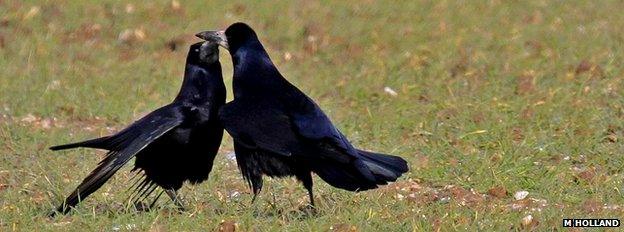Bird brains: Public asked to look out for clever rooks
- Published
Clever bird: How rooks break into bird-feeders
The British Trust for Ornithology (BTO) is asking the public to take part in a national survey of bird intelligence.
From 1 July, the charity is asking people to submit video clips or descriptions of the behaviour or rooks - some of our cleverest garden birds.
Rooks have already demonstrated their intelligence in lab-based studies that have tested their ability to solve problems and use tools.
This survey will examine if and how wild rooks apply these skills.

Rooks are highly sociable birds and are often seen in large groups
The rook is a member of the corvid or crow family, which is famed for its intelligence.
As well as solving laboratory-based puzzles, crows have been spotted exploiting urban environments by, for example, dropping walnuts onto busy roads and using the traffic to crack them open.
And although rooks are farmland birds, and tend to keep away from the middle of big towns and cities, they are increasingly being tempted into our gardens by bird feeders, so researchers hope this will provide the ideal setting to study their natural behaviour.
The study will look at six categories of behaviour: feeding, caching (hiding and storing food), tolerance, object play, socialising and vocalisation.
Dr Nathan Emery from Queen Mary University of London, an expert in corvid behaviour who is helping run the study, explained that many of the abilities the birds had demonstrated were previously thought to be uniquely human.
"We've done a lot of different studies on a number of corvids looking into their intelligence and behaviour, focusing on their amazing memories, their ability to imagine future scenarios and plan for them," he told BBC News.
"This survey will provide vital information that couldn't be attained any other way into how rooks use our gardens, eat and cache our food and, importantly, whether rooks can produce innovative solutions to novel problems they don't encounter in the wild."
As well a giving insights into the abilities of these clever crows, the charity wants to understand the behaviour of rooks in order to work out the reason for a decline in their numbers in recent years.